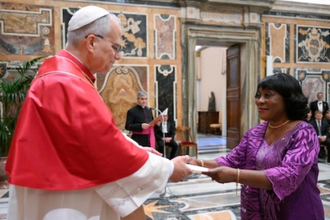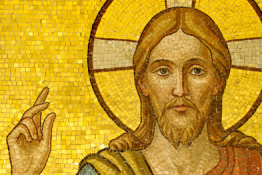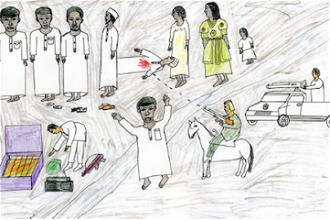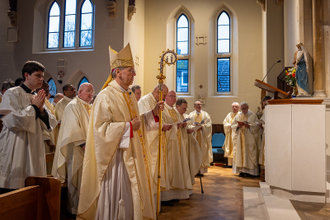Pope's in-flight press conference
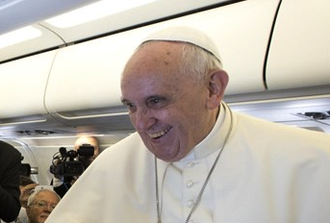
During his return flight following his apostolic trip to Africa, the Pope answered questions from the journalists accompanying him on the aircraft. The following are extensive extracts from questions posed and the Holy Father's answers regarding his impressions of Africa, the Vatileaks case, his upcoming trips and COP 21.
The first question was from a Kenyan journalist who wanted to know the Pope's views on the stories told by poor families in the Kangemi slum regarding exclusion from fundamental human rights due to avarice and corruption.
Pope Francis: "I understand that 80 per cent of the world's wealth is in the hands of 17 per cent of the population; I do not know if this is true, but it is likely, as this is how things are. ... It is an economic system in which money, the god of money, is at the centre. ... And if things continue in this way, the world will not change. ...
"..In Kangemi, where I spoke clearly about rights, I felt great suffering. ... Yesterday, for example, I visited a paediatric hospital, the only one in Bangui and in the country! And in intensive care they do not have the instruments to provide oxygen. There were many malnourished children, many. And the doctor told me, 'Here the majority will die, as they have malaria and they are malnourished. ... And those people who hold 80 per cent of the world's wealth - what do they think of this?"
The second question regarded the most memorable moment of the Pope's trip to Africa.
Pope Francis: "For me Africa was a surprise. I thought: God surprises us, but also Africa surprises! ... They have a great sense of welcome. ... Then, each country has its own identity. Kenya is a little more modern, more developed. Uganda has the identity of martyrs: the Ugandan people, both Catholic and Anglican, venerate the martyrs. ... The courage of giving life for an ideal. And the Central African Republic: there is the desire for peace, reconciliation, and forgiveness".
The third question touched on the issued of Vatileaks and the importance of the press in denouncing corruption wherever it encounters it.
Pope Francis: "A free press, both secular and confessional, but professional ... is important to me, because the denouncement of injustice and corruption is good work. ... And then those who are responsible must do something: form a judgement, constitute a tribunal. But the professional press must say everything, without falling prey to the three most common sins: disinformation, or telling half a story but omitting the other half; slander, or when the press is unprofessional and seeks to soil others with or without truth; and defamation, or rather, to damage a person's reputation ... and these are the three defects that undermine the professionalism of the press. We need professionalism".
A French journalist asked whether, faced with the danger of fundamentalism, religious leaders should intervene in the political arena.
Pope Francis: "If this means participating in politics, no. Being a priest, a pastor, an imam, a rabbi - this is the vocation of a religious leader. But political influence is exercised indirectly by preaching values, true values, and one of the greatest values is fraternity between us. ... Fundamentalism is a sickness that we find in all religions. Among Catholics there are many, not a few, many, who believe to hold the absolute truth and they go ahead by harming others with slander and defamation, and they do great harm. ... And it must be combated. Religious fundamentalism is not truly religious. Why? Because God is missing. It is a form of idolatry, in the same way as worshipping money is idolatry. Being political in the sense of convincing these people who have this tendency is a policy that we religious leaders must adopt".
An Italian journalist asked why two of the defendants in the Vatileaks case, Msgr. Vallejo Balda and Francesca Immacolata Chaouqui, had been appointed.
Pope Francis: "I think it was a mistake. Mgr. Vallejo Balda entered via the role he had has had until now. He was secretary of the Prefecture of Economic Affairs. I am not sure how he entered but if I am not mistaken, it was he who presented [Chaouqui] as a woman who knew the world of commercial relations. ... They worked and once they had finished their task, the members of the Commission, COSEA, remained in various places in the Vatican. The same applied to Vallejo Balda. Ms Chaouqui did not remain in the Vatican because she entered for the purposes of the Commission and then left. Some say that she was angry about this, but the judges will tell us the truth of the situation. ... For me [what came out] was not a surprise, it did not cause me to lose any sleep, because they have shown the work that began with the Commission of Cardinals - the 'C9' - to seek out corruption and things that are not going well. And here I want to say something ... on the word 'corruption'. Thirteen days before the death of St John Paul II ... in the Via Crucis, the then-cardinal Ratzinger spoke about corruption in the Church. He was the first to denounce it. And when St John Paul II died, in the 'pro eligendo Pontefice' Mass - he was the dean - he spoke about the same thing, and we elected him for this, his liberty to say these things. Since then there has been an air of corruption in the Vatican. ... With respect to the judgement, I have given the concrete accusations to the judges, because that is what is important for the defence, the formulation of the accusations. I have not read them, the concrete, technical accusations. I would have liked this to finish before 8 December, for the Year of Mercy, but I do not think this will be possible, as I would like the lawyers who defend them to have to time to defend; they must have the freedom to prepare a full defence".
A South African correspondent commented on the devastation caused by AIDS in Africa, where the epidemic continues, and where prevention is still the key. He asked the Pope whether or not it was time to change the Church's position on the use of condoms.
Pope Francis: "The question seems to me to be too narrow, or rather a partial question. Yes, it is one of the methods; the morality of the Church finds itself before a perplexity: it is the fifth or the sixth commandment, defending life, or that the sexual relationship must be open to life? ... This questions makes me think about what they did to Jesus once. 'Tell me Master, is it lawful to heal on the Sabbath?'. It is obligatory to heal! ... But malnutrition, the exploitation of people, slave labour, the lack of drinking water: these are the problems. Let us not ask if we can use this sticking plaster or another for a small wound. The great wound is social injustice, the injustice of the environment, the injustice that I have mentioned such as exploitation and malnutrition. ... I do not like to make reference to such specific cases when people die for lack of water or hunger, because of their habitat. ... When everyone has been healed, when there are no longer these tragic diseases caused by mankind, either by social injustice or to earn more money. ... Then we can ask the question, 'is it lawful to heal on the Sabbath?'. Why do they continue the production and trafficking of weapons? Wars are the greatest cause of mortality. ... I would say, do not think about whether or not it is lawful to heal on the Sabbath. I would like to say to humanity: ensure justice, and when everyone is healed, when there is no more injustice in this world, we can talk about the Sabbath".
An Italian journalist wanted to know if the Pope had considered going to Armenia to commemorate the 101st anniversary of the tragedy that afflicted the population, as he did last year in Turkey.
"Last year I promised the three Patriarchs that I would go: the promise is there. I do not know if it will be possible to do so, but the promise stands. ... As for wars, wars are due to ambition. I am talking about wars that are not a legitimate defence against an unjust aggressor, but rather wars, wars are an 'industry'! ... War is a business, a weapons business. Terrorists, do they make their weapons? Perhaps the odd small one. Who gives them the weapons for warfare? There is a network of interests involved, and behind this there is money, or power: imperial power, or economic power. ... But we have been at war for many years, some times more than others: the pieces of the war are smaller, then they become bigger. ... I don't know what the 'Vatican position' is, but what I think is that wars are a sin against humanity. They destroy humanity, they are the cause of exploitation, of human trafficking, of so many things. ... Wars are not of God. God is the God of peace".
Another issue was whether the Conference on Climate Change in Paris will be the beginning to a solution to the environmental problem.
Pope Francis: "I am not sure, but I can say that it is now or never. Every year the problems grow more serious. ... We are at the brink of suicide, to put it bluntly. And I am sure that almost all those who are in Paris, at the COP 21, are aware of this and want to do something. ... I am trustful. I trust these people, that they will do something; because, I would say, I am sure that they have the goodwill to do so, and I hope it is so. And I pray for this".
An American journalist asked what he thought Islam the teachings of the Prophet Muhammed had to say to today's world.
"It is possible to enter into dialogue; they have values. Many values. And these values are constructive. ... Prayer, for example, and fasting. Religious values, and also other values. One cannot cancel out a religion because there are some groups, or many groups, at a certain historic moment, of fundamentalists. It is true that there have always been wars between religions throughout history, always. We too must ask forgiveness. ... And the Thirty Years War, the St. Bartholomew's Day massacre. ... We too must ask forgiveness, for fundamentalist extremism and for religious wars".
The Pope's visit to Mexico and other Latin American countries was the theme of the next question.
Pope Francis: "I will go to Mexico. First of all, I would like to visit Our Lady, the Mother of America, and so I will go to Mexico City. If it were not for the Virgin of Guadalupe, I would not go to Mexico City, as I would prefer to visit three or four cities that had not been visited by Popes. But I will go to visit Our Lady. Then I will go to Chiapas, in the South, on the border with Guatemala; then I will go to Morelia, and almost certainly, on the way back towards Rome, I will spend a day or less in Ciudad Juarez. With regard to visiting other Latin American countries, I have been invited to go to Aparecida in 2019, the other Patroness of America, for Portuguese speakers. ... and from there perhaps I will be able to visit another country - but I do not know, there are no plans".
The final question was from a Kenyan journalist, who asked: "What do you say to the world, which thinks that Africa is simply ravaged by wars and full of destruction?"
Pope Francis: "Africa is a victim. Africa has always been exploited by other powers. From Africa, slaves were taken to America, and sold. There are powers that seek only to take the great wealth of Africa. I don't know, it is possibly the richest continent. ... But they do not think of how to help countries grow, to promote work, so that everyone has work. ... Exploitation! Africa is a martyr. She is a martyr to exploitation in history. Those who say that from Africa is the home of all calamities and all wars do not understand well, perhaps, the damage that humanity has done to certain forms of development. And it is for this reason that I love Africa, because Africa has been a victim of other powers".



